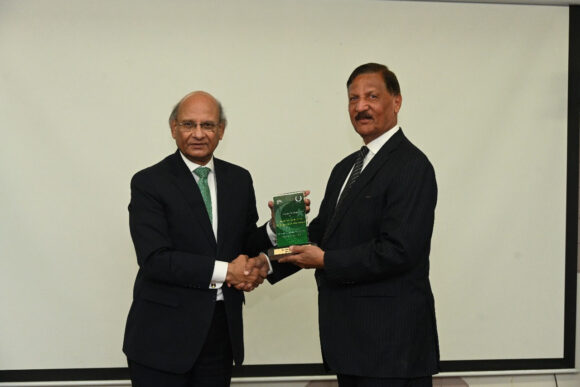Islamabad -UNS: The NUST Institute of Policy Studies (NIPS) organized the high-level national seminar on “Pakistan’s Economic Crisis: Challenges and the Way Forward” on Thursday, January 18, 2024. Moderated by Dr. Ashfaque Hasan Khan, Director General, NIPS, the event attracted diverse participation comprising senior policymakers, high-level dignitaries, government officials, veteran diplomats, development professionals, economic experts, academics, think tank leaders, scholars, and students.
The national seminar consisted of two sessions with renowned speakers, accompanied by keynote addresses by esteemed ministers, analyzing the economic dynamics of Pakistan.
In the first session, Dr. Ashfaque Hasan Khan, Director General, NIPS, delivered a comprehensive overview of Pakistan’s economic crisis. His insightful lecture provided a broad analysis for addressing the economic challenges faced by developing countries, like Pakistan, in managing their debt burdens. Dr. Khan shed light on the intricate dynamics associated with monetary policy within the context of Pakistan.
Dr. Shamshad Akhtar, Caretaker Federal Minister for Finance, Revenue & Economic Affairs, the seminar’s Chief Guest, delivered the keynote address on Pakistan’s economic challenges and the way forward. The honorable minister highlighted five key areas that have increased the vulnerability of Pakistan’s economy to domestic and global shocks: first, the increase in public debt, with Pakistan in breach of the FRDL Act since 2013; second, climate shocks as the global warming model predicts that Pakistan’s weather patterns will become even more volatile and extreme in the decades ahead, with an average increase in temperatures by 1.3% to 4.9% by 2090; third, the lack of innovation and diversity in the structure of the economy; fourth, unsustainable fiscal policy due to revenue gaps and unproductive expenditures; and fifth, the failure to integrate Pakistan’s economy with the rest of the world.
During the keynote, the minister further stressed five critical areas of reforms essential to reducing Pakistan’s vulnerabilities and fostering sustainable growth that included: a comprehensive overhaul of the government’s fiscal apparatus necessary to lower the revenue-expenditure gap; addressing structural weaknesses of SOEs and improving their efficiency and functioning, reducing the debt burden; and enhancing competitiveness and encouraging new investments.
Dr Shamshad Akhtar concluded by stating that bold reforms would lead to a new era of development and prosperity in the country and that effective implementation of ambitious reforms will depend on addressing critical underlying institutional and governance constraints.
Mr. Sakib Sherani, Founder & CEO of Macro Economic Insights (Pvt) Ltd, delved into the critical challenges surrounding contemporary economic condition of Pakistan. While discussing the issues of economy he said that the fault-line is structural and primarily rooted in the Pakistan’s heavy reliance on imports, the challenge of attracting FDI, a small and undiversified export base, a flawed growth model, and the impact of an overvalued exchange rate.
Mr. Sherani’s policy recommendations included institutional reforms, improving the investment climate, addressing negative IMF program externalities, salvaging CPEC for regional value chain integration and Chinese investment, and recalibrating SEZs into export-oriented industrial clusters. He stressed that these measures are crucial for enhancing Pakistan’s economic outlook.
During the second session, Dr. Muhammad Khan, Professor and Chairperson of the Department of Politics and International Relations at the International Islamic University Islamabad (IIUI), talked about the topic of political instability and its effects on the economy. Conducting a comparative analysis, the speaker underscored the strengths and weaknesses of Pakistan’s political landscape consisting, among others, of resilience and resistance to change, respectively.
Dr. Khan further stressed that sustainable economic reforms should not be subject to fluctuations of electoral cycles. He stated that it is imperative maintain the continuity of growth strategies regardless of changes in government. Highlighting the interdependence of political and economic stability, Dr. Khan observed that political stability affects economic stability inevitably. He stressed good governance as the way out of political instability.
Dr. Ather Maqsood Ahmed, a Professor of Economics at the NUST School of Social Sciences & Humanities, shared insights on fiscal and tax reforms. He emphasized that the complete digitalization of the tax system and reassessment of the role of regulatory bodies was imperative. Dr. Ahmed stressed that tax collection should be seen as a by-product of the economy. He advised that the focus should be on removing growth bottlenecks since a high-growth economy automatically generates enough resources, leading to a comfortable economic management and broad tax base in time.
Muhammad Ali, the Caretaker Federal Minister of Energy, Power & Petroleum, discussed the energy crisis and energy sector reforms in Pakistan. Recognizing the interlinked nature of the Pakistan’s power and energy challenges, the minister emphasized the need for comprehensive structural reforms as economic activity has collapsed due to import controls, creditworthiness downgrades, and ballooning interest payments. He said that a strategic approach is needed to meet the country’s energy requirements as Pakistan relies heavily on gas and oil as main sources of energy, while industries and transport consume the largest chunk of the energy produced.
The presentations were followed by an extensive discussion session where participants articulated relevant points bearing on good governance, political stability, consistent growth policies, innovation promotion, energy infrastructural overhaul, sustainable economic development, dialogue as a way out of political and decision-making deadlocks, resource indigenization, reform of energy pricing, and the restoration of investor confidence.
1




